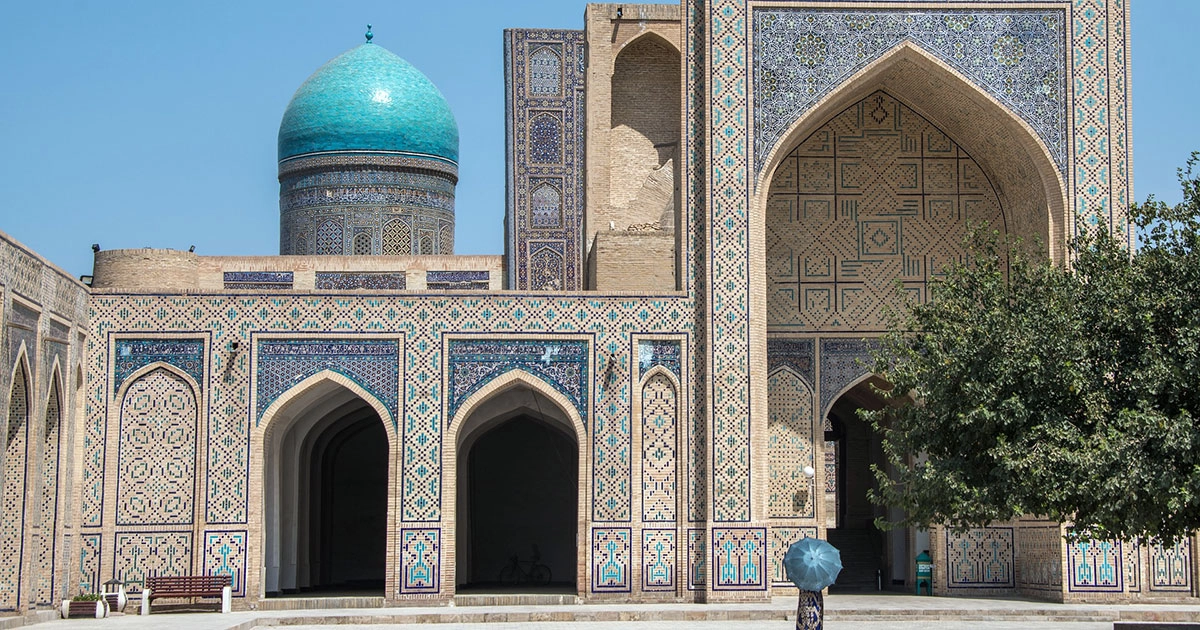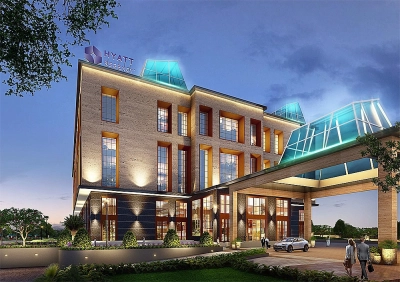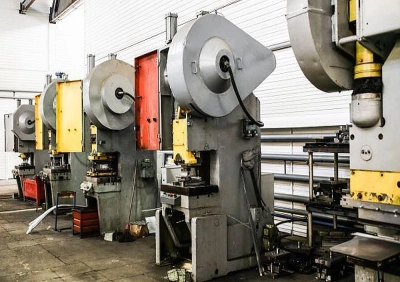Uzbekistan
Uzbekistan is a sovereign state occupying a vast territory in the central part of Central Asia. In the past, it was the center of the vibrant Enlightenment era of the medieval East. Now the country attracts tourists with its expressive appearance. Uzbekistan is rich in mountain and steppe landscapes, architectural masterpieces and unusual cities.
The official name of the state is the Republic of Uzbekistan. The capital is Tashkent, which is now home to more than 2.3 million people. The national currency is the Uzbek sum. The population of the country is 35 million people. Despite the fact that Uzbekistan is a secular state, the influence of religion, as in any eastern country, is very strong in it. About 93% of the country's population professes Islam (Sunnis), and about 4% are Orthodox Christians. The official language in the state is one — Uzbek. The territory of the country is divided into 12 regions, one autonomous republic and one independent city.
The largest cities in Uzbekistan are Samarkand, Namangan, Fergana, Bukhara, and, of course, Tashkent. One of the main attractions and a symbol of Uzbekistan is the Registan Architectural Ensemble, located on a square in the center of Samarkand.
In the Middle Ages, the Great Silk Road passed through the territory of modern Uzbekistan, connecting China with Europe. The Uzbek cities of Samarkand, Bukhara, Khiva and Shash (modern Tashkent) flourished on this caravan road. In these cities, a large number of unique sights, mosques, mausoleums, madrasahs and palaces have been preserved to this day.
For many centuries, Uzbekistan was under the rule of the Parthian kingdom, the Sasanian Empire and the Samanid state. In the 8th century, the Arabs conquered Uzbekistan and brought Islam there. Then the territory of modern Uzbekistan was under the rule of the Mongols. In the 14th century, in the era of Timur, Uzbekistan experienced another heyday. In the 19th century, Uzbekistan became part of the Russian Empire; this process continued for several decades. In 1924, the Uzbek SSR was formed, which became part of the USSR. The independence of Uzbekistan was proclaimed in August 1991.
In the east, Uzbekistan borders with Tajikistan and Kyrgyzstan, in the north and west with Kazakhstan, and in the south with Turkmenistan and Afghanistan. This state has no access to the sea. The total area of Uzbekistan is 448,900 square kilometers. The territory of Uzbekistan is a combination of plains, foothills and mountains. The plains are in the southwest and northwest of the country, and the foothills and mountains are in the east and southeast. The highest peak in Uzbekistan reaches a height of 4,643 meters. Uzbekistan is characterized by high seismicity. Sometimes tremors reach 8-9 points.
The largest rivers in Uzbekistan (and, by the way, throughout Central Asia) are the Amu Darya and Syr Darya. A significant part of Uzbekistan is occupied by deserts, for example, Kyzylkum. Tourists come to Uzbekistan for local attractions, skiing and outdoor activities. There are two ski resorts in Uzbekistan — Chimgan and Beldersay, which are located northeast of Tashkent.
The culture of Uzbekistan is bright and original, it has been formed over thousands of years and absorbed the traditions and customs of the peoples who at different times inhabited the territory of modern Uzbekistan. The ancient Persians, Greeks, nomadic Turkic tribes, Arabs, Chinese, Russians contributed to it. The traditions of multinational Uzbekistan are reflected in music, dance, painting, applied arts, language, cuisine and clothing.
The first and most eastern cultural attribute is the bazaar. Its role in the life of local residents is very great. This is not only a place for shopping, but also a center for communication, exchange of news, emotions and impressions. Also, traditional Uzbek music is one of the ways to understand the identity of the Uzbek people. One of the most unusual traditional occupations is askiya (the art of wit), a genre of oral folk art based on the demonstration of eloquence and the use of figurative meaning. This is a discussion or exchange of taunts in a jocular manner between two or more men on a particular topic.
Doing business in Uzbekistan is also influenced by culture. If Western business is often conducted according to strict plans, built in advance agreements, and everyone knows what will happen tomorrow and what will happen in a month, then in Central Asia this approach does not work. Entering this market, you should be ready to constantly change something and adapt to new conditions. Business in Uzbekistan requires flexibility and constant attention and activity. At the same time, the business itself, which enters Uzbekistan, also needs to be swift, changing and quick in resolving issues. This helps to build relationships with local partners and investors, and also inspires confidence in the company.
The mentality of the Uzbeks is also closely connected with Eastern traditions in general. An important concept is “angisha”, the meaning of which lies in the initially peaceful perception of human mistakes, a wise and tolerant attitude towards aggression or negativity towards oneself. Such Eastern tolerance, due to the Uzbek mentality, gives the negotiators an opportunity to think about their actions and come to a compromise.
Also, representatives of the Uzbek ethnic group are characterized by a high relevance of family relations, since it is believed that "any family ties are from God." Regardless of the social status of a relative and the intensity of communication with him, members of the family clan will always help the Uzbek solve the problem. Such cohesion is due to the fact that the family is the basis of the Uzbek ethnic group, and family values are the values of the whole people. Uzbeks usually live in large families, consisting of several generations.
The social and family way of life of Uzbeks is determined by Islamic tradition. Respect for elders and unconditional obedience to the head of the family are the foundation of the Uzbek family. As a rule, every Muslim voluntarily contributes part of the money he earns (in Uzbek such a donation is called “zakat”) in favor of the needy or for charitable deeds. Uzbek culture, like Chinese, Japanese, Kazakh, is classified as a collectivist culture. We should also mention the ancient Uzbek custom of mutual assistance “hashar” (translated from Arabic and Persian — “joint work, charity”). This is a Muslim tradition of voluntary unpaid labor to help a certain family build a house or improve their quarter, district, street.
According to the current Constitution, Uzbekistan is a parliamentary republic headed by the President. The main difference of this Constitution is the priority of the interests of the citizen over the interests of the state. The bicameral parliament in Uzbekistan is called the Oliy Majlis, it consists of the Senate (100 senators) and the Legislative Chamber (150 deputies), and is also the highest state representative body. Only the Oliy Majlis elected by them and the President of the Republic can speak on behalf of the people of Uzbekistan. No part of society, political party, public association, movement or individual can do this. The system of state power of the Republic of Uzbekistan is based on the principle of separation of powers into legislative, executive and judicial.
Executive power is exercised by the Cabinet of Ministers of the Republic of Uzbekistan. It consists of the Prime Minister of the Republic of Uzbekistan, his deputies, ministers, chairmen of state committees. The judiciary in the Republic of Uzbekistan operates independently of the legislative and executive authorities, political parties, and other public associations. The Law of Uzbekistan "On Freedom of Conscience and Religious Organizations" dated May 1, 1998 prohibits any religious political parties.
Uzbekistan, which in the USSR had an agricultural, or rather, a narrow "cotton" specialization, made a big leap forward. Uzbek textiles are easy to find in any Russian region. There was a mechanical engineering. "Matis", "Nexia", "Ravona" and many other cars are produced in the Andijan region. Uzbekistan's GDP growth is approximately 12% per year. Remittances from people working in Russia play an important role in the economy. Experts say that in four or five years, Tashkent may have economic leadership in the region. Uzbekistan is the only country in the region that is preparing to build a nuclear power plant. The nuclear power plant in Uzbekistan will make the country independent of the resources of its neighbors. The Russian company Rosatom is going to build it.
In 2018, Uzbekistan ranked 44th in the UN ranking of 158 countries in terms of well-being. The republic extracts oil and gas, grows cotton and astrakhan sheep, manufactures high-quality cotton fabrics, produces machinery and electrical equipment. Export of Uzbekistan is 27% less than import. The main problems of economic development are: the outdated material base of industrial enterprises, the need for water and grain crops, the distance to sea logistics routes.
There are 28 banks, 4 stock exchanges, 27 insurance companies operating in the country. There are 80 universities in the republic, where the cost of education is low. However, the Internet does not work well in the country, which significantly reduces the demand for education from foreign students.
Tourism is developing rapidly, and high-speed tourist trains are already running between the main historical cities of Uzbekistan - Bukhara, Samarkand and Khiva.
According to a survey by the Center for Economic Research and Reforms, in December 2022, the consolidated indicator of the business climate increased by 4 points and amounted to 57 points, which assesses the state of the business climate in the country as positive.
Uzbekistan has implemented ambitious reforms that have improved the business and investment climate in the country and will contribute to economic growth in the medium term.
The owners of the companies noted that in recent years there has been a reduction in various obstacles to doing business and may also be a factor in the improvement in indicators. The largest share of entrepreneurs who noted the ease of doing business was noted in the service sector, growth.
In general, across the republic, entrepreneurs have become less likely to worry about access to land and tax administration. The problems associated with tax administration in the industrial sector have been significantly reduced.
In terms of capital intensity, calculated by international experts, Uzbekistan is an attractive country for foreign direct investment. The Republic is among the countries that have achieved the best results over the years in improving business performance through regulatory reforms aimed at improving the business environment.
Among these reforms are the liberalization of the foreign exchange market and the creation of 7 special economic zones with tax incentives for investors. As a result, over the past 4 years, foreign direct investment in Uzbekistan has tripled. According to the State Statistics Committee of Uzbekistan, FDI inflows increased to $6.6 billion in 2021.
The government is implementing major reforms to improve the investment climate in Uzbekistan. The policy of liberalization, the market mechanism for setting the exchange rate, the removal of administrative barriers to foreign investment, the reduction of the state's share in the economy, and the launch of a full-scale privatization program initiated by the government are the key areas of the five-year plan.
Uzbekistan is making efforts to increase the capacity of the transport system, remove existing barriers to unhindered transit through the territory of Uzbekistan, which is of great importance for the development of international transport corridors in Central Asia.
The political and economic situation in the country gives good chances for the accelerated development of business and entrepreneurship, successful investment in long-term investment projects. Thus, according to the results of a survey of representatives of various companies about the business climate in Uzbekistan, about three-quarters of respondents believe that business development in the country has a positive trend.
The most important direction in the development of investment activity and attraction of investments in the industry is the reduction of state interference in the activities of large companies and the expansion of public-private partnerships. Relations between the state and small private business should also be based on mutual interest. For citizens of about 60 states, including Russia, Ukraine and Kazakhstan, a visa is not needed, for this you only need a passport, which greatly simplifies business interaction.
One of the measures to improve the investment climate and attract investment in manufacturing industries is the introduction of a modern management system at enterprises and the development of measures to increase investment attractiveness. For this, foreign experts in the field of organization and production management are regularly involved.
The growth of investor activity is facilitated by the development and implementation of a system of interconnected indicative planning for the development of industries and regions. Transparency of procedures, reduction of terms of examination of project documentation and justification for the application of benefits and preferences to ongoing projects are also of great importance.


76,123,552 ¥

1,038,048,435 ¥

15,224,711 ¥









